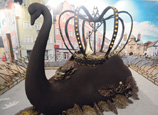
Bridging the cultural divide
Beijing has made efforts in the past to clean up its act for the global spotlight. Before the 2008 Beijing Olympics, a manners campaign was launched and more than 100,000 authentic copies of a book titled Etiquette for the Modern Chinese were distributed.
But many Chinese already know the difference between good and bad public behavior, according to Zhang Fang, a professor of Chinese history at Peking University.
"China is historically based on respect for rules and laws. There have always been high requirements demanded of citizens, but in today's society, disrespect has emerged for these types of rules," Zhang said.
After the Cultural Revolution, China "started from scratch" and consequently lagged behind in civil behavior compared to Korea and Japan, he said.
"When I was young, the idea of lining up was non-existent, but now you can gradually see some improvements. Though you might not notice it at all, to me there is improvement," he said, noting that change was a "step-by-step" process.
It's not just Chinese who are learning, either. Foreigners coming to China hoping to conduct business also have lots to learn to adhere to local etiquette customs.
Business cards, for example, must be presented with two hands to the receiving party as a gesture of respect, though plenty of Western professionals miss out on this nuance when exchanging first-time pleasantries.
"I feel ashamed of rude behavior [by Chinese overseas], but on the other hand I understand it, too. People are used to acting a certain way in China. You can't expect them to change overnight," said Yu Xiao, 27, who travels domestically and internationally in his role as a manager at a State-owned enterprise in the oil and gas industry.

















 Employees run half-naked for not meeting sales quotas
Employees run half-naked for not meeting sales quotas


![]()
